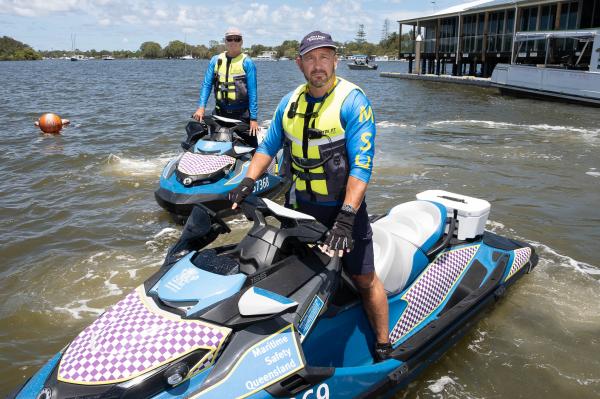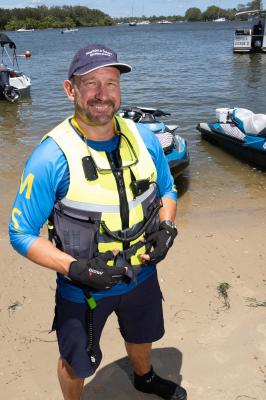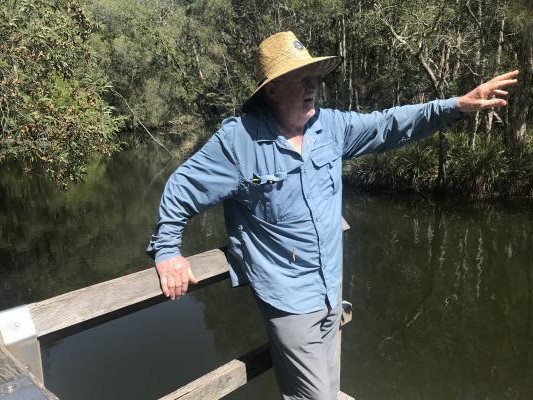After more than half a dozen attempts over two decades to get the warring parties to work together, sources within the 14-member Noosa River Stakeholder Advisory Committee say that this one might work.
Following last week’s inaugural meeting of the panel representing a broad cross-section of river interests from commercial to environmental, Noosa Today was told that after a fairly “boisterous” start, members settled into the constructive work of establishing a set of priorities for problem-solving on the river, possibly because the once-warring factions had reached an agreement to co-operate weeks in advance.
Co-chair and Maritime Safety Queensland general manager Angus Mitchell said: “It’s a first step and I think it’s important one because we’ve got such a diversity of interests here and we need them to work together. We’re not starting from scratch, but there’s a lot that’s been started that hasn’t quite come to fruition over the years. So what we’re about initially is prioritising, not necessarily looking for the results we want for the entire ecosystem of the river, but addressing some of the sticking points that haven’t been addressed adequately for many years.”
Noosa Council CEO Brett de Chastel, the other co-chair, agreed. “It was great to see some robust conversation and a common interest in working together for the betterment of the river,” he said. “It was great to be able to attend the committee’s first meeting as an observer and see their enthusiasm for the river and for developing solutions to the big issues,” said Mayor Clare Stewart, who alongside Noosa MP and fellow observer Sandy Bolton had pushed hard for the establishment of the committee.
But predictable homilies aside, what did this historic first meeting of the river tribes achieve? According to MSQ’s Angus Mitchell, prioritising the most important issues and starting an analysis of the real problems within each was an important beginning, and other sources agree. And perhaps unsurprisingly, the issue that dominated was the perceived problem of “live-aboard” houseboats and yachts, although one source at the meeting told Noosa Today that this was a “red herring” to divert attention from the broader issue of unauthorised anchoring on the river.
Says Angus Mitchell: “With issues like this you need to be very clear about what you want. There’ll be a section of the community that wants live-aboards (or in MSQ parlance “live-on-boards” or LOBs) gone entirely, another that wants them better regulated, and others that want to limit numbers. Live-aboards are an issue throughout Queensland, and people have different perceptions about what one is – is it a yacht anchored here for three days or is it a houseboat tied up to the mangroves more or less permanently? If we understand what the problem really is, then we can look at the legislative powers we have to deal with it. Because these issues are so complex, this is a high priority for the group.”
MSQ, which issues six-month rolling permits for living on the river, once requirements such as proper effluent holding tanks are satisfied, currently has only seven active six-month permits – and a couple of these are not being used as permanent dwellings) plus three two-month casual permits. Commercial houseboats are exempt from permits and people can live on board a vessel for up to 48 hours without a permit. Estimates vary, even within MSQ, as to how many illegal live-aboards are on the river, but it could be as high as 30 or as low as 10.
If the low number proves correct, taking a more holistic approach to anchorages and moorings restrictions, with live-aboards being dealt with on a case-by-case basis, might be the best solution. Certainly this is what some of the more influential voices on the river committee are advocating.
Says Mitchell: “The other side of this is we have to identify specifically what the community sees as the problem with live-aboards. Do people resent it when others are living cheaply on the waterways, are they a navigational hazard or is it about their effluent or the visual amenity? Proving that people are living aboard is another minefield, of course. MSQ doesn’t have the manpower to do that effectively, so that’s a logistical problem we may have to address.”
Another major priority for the committee is the issue of restrictions on speed or wash. Says Mitchell: “The meeting didn’t go a lot into maximum speed limits but I suspect that in coming meetings there will be views on the seasonal speed limit and whether it needs to be modified. Would you have it six knots all the time, or would you have it from 7am so that the fishermen can do 20 knots on their way out? Is it speed that’s the issue or is it wash, or a combination of both? This is the kind of information we need to gather about the nature of the problem before we try to find the solution. But navigational safety is, of course, a primary concern for MSQ, and we believe that stepping up our compliance enforcement is already having an impact.”
Because wash from boats is a major erosion issue, the green elements on the committee are determined to see greater restrictions in place, but as a source pointed out to Noosa Today, as with live-aboards, the issue is complex, because greater speed doesn’t necessarily cause greater wash. Just another example of how this committee is going to have to tread very softly if it is to achieve lasting results.
But there was a warm glow over the Noosa Coastguard HQ last Wednesday week, as old sparring partners like former mayor Noel Playford, fishos Chris Massoud and former Noosa MP and state minister Bruce Davidson, and environmental warrior Michael Gloster made good on their prior agreement to put their differences aside in the interests of achieving river reform.
As one source told Noosa Today: “There’s a lot of talent in the group including a core of old hands who’ve lived through all the previous failures and really want this one to finally succeed.”











